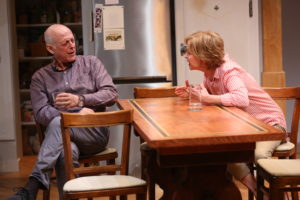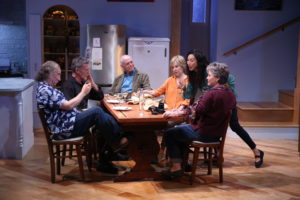Older audiences will likely recognize husband and wife team Michael Tucker and Jill Eikenberry from the hit television show, L.A. Law. Both were Emmy and Golden Globe-nominated several times for the NBC drama which ran from 1986-1994.
While Eikenberry continues her acting career, Tucker has turned his attention to playwriting. His current play, Fern Hill, was originally workshopped at the esteemed Eugene O’Neill Theater Center in 2017. Since then, it went on to play at New Jersey Repertory Theater and is currently running Off-Broadway at 59E59 Street Theater. A recent extension was announced.
Eikenberry stars in the play about six mature adults who propose living together under one roof as an alternative to formal nursing care.

Manhattan Digest recently spoke with the married couple about the play, the joys and challenges of aging, and the secret to long- term coupledom.
MD: What was your impetus for writing a play?
MT: It kind of snuck up on me. The fourth book I wrote was a novel. I had a good time working on that, so I started another novel, writing it in the first person. I got going on that in an extended rant. It was about a man talking about his life and family. I thought that the woman figure should have something to say as well. So I underlined her name and realized, ‘Oh! It’s a play‘. That was called The M Spot. And then this play came along.
MD: Jill, did you have much input into the writing?
JE: I’ve been very involved in the process of both plays. In Fern Hill, I felt as though the woman characters needed to be fleshed out a bit. I was the muse for this character.
MT: And Jill’s feedback really lands with me too.
MD: Michael, Was there ever a time you thought of putting yourself into Fern Hill?
MT: No. I did that against my will in the first play and felt as though I cheated myself out of the playwriting experience. I was too focused on acting. I write like an actor so I act all the parts out and I know exactly how every character speaks according to me. That’s not interesting. I know how I think it sounds. What’s interesting to me is what other people do with it.
MD: Jill, do you have any playwriting aspirations?
JE: No. I’m not the writer in the family and that’s just fine. I had fun directing a 10-minute play that Mike wrote or a festival at New Jersey Rep. Right now, I’m feeling very lucky. This is so rare what I’m getting to do. To be able to act a part this good in a play that my husband wrote with five other actors who I love… plus our wonderful director Nadia Tass…it’s really been a dream. I can’t think of anything else I’d rather be doing.

MD: Was New York always the end-game for this play?
MT: I think we all have New York at the back of our minds. It’s the place
JE: The day we found out that Mike got accepted at the O’Neill was one of the highest days we’ve had because we were both actors there. The O’Neill is a beacon to the art of playwriting. Every minute there was a cherished moment.
MD: One of the things about this play is that it really honors and edifies older people. What are your own pros and cons about the aging process?
MT: I feel like this is the most exciting time of my life. I hope to keep that going. We’ve both changed and I feel very lucky to start a new career at this point in my life. My favorite moment in the play is something that our director created. The change between scene 1 and scene 2 when everyone is setting the table with music playing and being playful with each other is really special. These are people between 60-80 who are vital and sexual and active. That’s what the play is about.
JE: I feel like the biggest and best thing about getting to this age is that I keep learning about myself and getting truer to myself. I’m not as hard on myself as I once was. I have more compassion for myself. As an actor, that’s a wonderful, new place to be. The downside? I probably tire more easily, but the enthusiasm I have for new things counteracts that tiredness. I don’t have the same roadblocks as I used to have. Also, I had breast cancer twice. I didn’t know that I’d be here, so to be here now and feel just as alive and fantastic as I do, I just can’t find anything wrong with that!
MD: You’ve been married for nearly 50 years now, right?
MT: 46 actually
MD: To steal the words of Alan and Marilyn Bergman, ‘How do you keep the music playing?’
JE: That’s a great song
MT: It’s really not difficult for us. We’ve been through different stages in our relationship. The first 15-20 years our kids and careers really took precedence over everything. After LA Law, we sort of dropped out of the game for a while. We moved to Northern California and began to focus on our relationship. It was always good, but we asked ourselves ‘how good could it get?’
JE: We learned a lot of things, some of which are in this play about the man/woman dynamic and how skewed it can get. What does equity in a long term marriage look like? I think that’s an important issue for everyone, not just for those in their golden years. We’ve had a lot of younger people approach us and tell us that they are confused about how do be in a successful relationship. I think in the #metoo movement, one area that hasn’t been explored is equity in a long term marriage. It’s not been discussed. People make deals in long term marriages and sometimes, those deals are not fair or they don’t work. We spent time looking at that with some really brilliant people. I think it set us up with a lot of tools for communicating with one another and for making each other win. We know that if one wins and the other loses, we’re in trouble.
MD: It’s one thing to keep a marriage alive, but another to keep a happy one alive. To enjoy the person you’re with is so special.
MT: We’re pretty lucky in the sense that we’re up for the same kinds of things. Neither one of us leads all the time. If one of us has a burning idea to do something, we’ll talk about it and usually, we’ll agree to do it, so that adds to the fun
MD: Who does most of the cooking?
MT: I do most of it, but Jill cooks as well. She’s mostly vegan these days, so that’s changed my diet quite a bit too. If I don’t want to cook two meals, I’ll have what she’s having which has been an awful lot of vegetables.
JE: It’s really great in the summer to have all of these fresh vegetables from our garden in Connecticut. It’s inspiring.
MT: This whole thing about farm to table is something else. Between the farm and the table is a cook and if the cook isn’t that good, you’re not gonna get a good dinner!
MD: It’s funny how we’ve coined that term in recent years. Our ancestors were doing that long before we tried to make it hip.
JE: My grandmother didn’t call it farm to table. She just called it eating! (laughs).
MD: Any big plans for your 50th?
MT: We have a little time to plan. We’ll probably do something nice with our kids and our friends.
JE: We definitely have some time. We have this wonderful place in Italy and we just found out that we’ll have to postpone our trip there because the play has been extended. Our 50th seems like awhile from now.
MD: How have audiences at 59e59 Street Theater reacted to the show?
JE: They’ve been great. They’ve been so responsive to the play and so appreciative of having seniors portrayed onstage who aren’t a joke or a send-up. It’s really refreshing.
MD: I imagine you’ll be licensing this for production at other theaters?
MT: I imagine so, but I haven’t thought about it. I hope it plays at a lot of theaters in productions where I’m not involved.
JE: A lot of regional theaters have a core group of older actors and this play…with such great parts…would be a wonderful thing!
Fern Hill runs through Oct. 27 @ 59E59 Theaters (between Park and Madison). For tickets and information, visit 59E59 Theaters.
